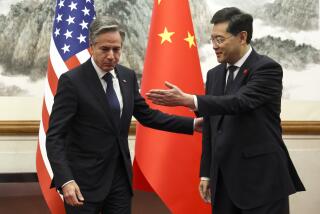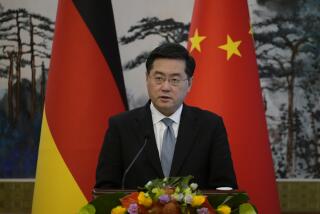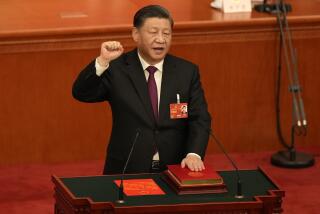Tibet, Human Rights Are Internal Issues, Official Says : U.S. Criticism Sparks Rebuke by China
- Share via
BEIJING — Foreign Minister Qian Qichen sharply lectured the United States on Monday, saying American expressions of concern about issues such as political dissent, Tibetan nationalism and population control in China constitute unwarranted interference in this country’s internal affairs.
Speaking at a news conference in the Great Hall of the People, Qian also said that in order to make a success of the Sino-Soviet summit planned for mid-May, Moscow must press Vietnam harder to withdraw its troops from Cambodia and to agree to a political settlement of the conflict in that country.
Qian’s most heated comments came when asked whether foreigners have the right to express views about the situation in Tibet, recently the scene of anti-Chinese rioting, or about human rights in general in China.
The U.S. Senate recently passed a resolution that accused China of human rights violations in Tibet. Qian expressed especially strong resentment about this.
He also objected to persistent congressional criticism of China’s strict family planning rules, which routinely place great pressure on women to abort pregnancies if they already have one child.
Some U.S. congressmen “are actually very poorly informed about the situation in Tibet, but they have very strong prejudice,” Qian said.
“Another incident in this connection is that some people in the American Congress always want to debate China’s policy concerning family planning,” he added, his voice rising in anger as he jabbed a finger in the air for emphasis. “I think this in itself is fairly absurd.”
Qian said that if the United States had five times its current population--which would approximate China’s 1.1 billion people--he was confident the U.S. Congress would exhibit full understanding of China’s population policies.
An Internal Matter
“If China has taken acts that are those of a sovereign state . . . this is not something that foreign parliaments can debate about,” Qian said. “This represents interference in the internal affairs of China.”
Qian said that U.S.-China relations “enjoy a vast potential” but “at the same time, there is a need for us to work to build mutual trust and reduce trouble.”
Problems also remain that must be addressed in Sino-Soviet relations, he said. The summit scheduled for mid-May in Beijing between Soviet President Mikhail S. Gorbachev and Chinese leader Deng Xiaoping will contribute to world peace, but how much the summit achieves in practical terms depends on progress in achieving a Cambodian settlement, Qian said.
China supports a three-faction Cambodian resistance coalition headed by Prince Norodom Sihanouk that is seeking to oust the Vietnamese-installed Phnom Penh government. Qian said that various countries, including the United States, should continue cooperating with the resistance to bring greater pressure on Hanoi to withdraw its troops from Cambodia.
“We support the request by Prince Sihanouk to foreign countries for aid,” Qian said. “We also appreciate the support given by the United States to Prince Sihanouk. We believe that at the moment the international community should strengthen its support to the resistance forces in Cambodia so as to pressure Vietnam to withdraw its troops from Cambodia at an early date.”
More to Read
Sign up for Essential California
The most important California stories and recommendations in your inbox every morning.
You may occasionally receive promotional content from the Los Angeles Times.













